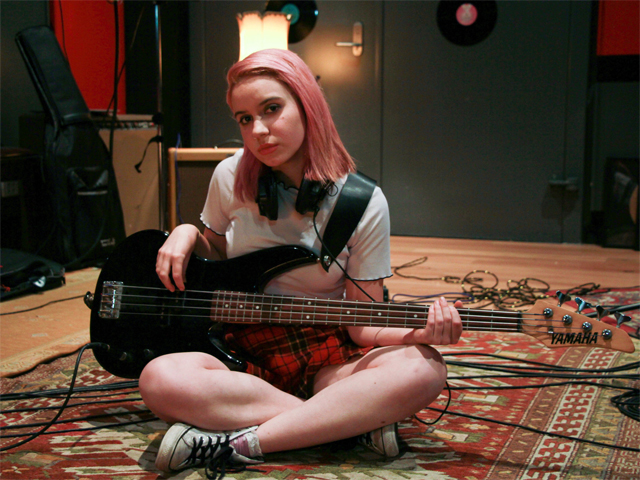Melbourne Women in Film Festival

Arriving fresh to welcome in the new decade and hopes for a better gender balance in the film industry, the Melbourne Women in Film Festival is thrilled to announce its 2020 program and theme today – Stories in Colour, showcasing the differences and diversity of women's filmmaking, highlighting the many ways they engage with local and global storytelling from February 20-23.
This year's program will feature for the first time incredible films made by women from Aotearoa/New Zealand and the Pacific Islands, kicking off for the opening night party with Vai (2019) - a portmanteau feature film created by nine female Pacific filmmakers and filmed across seven Pacific countries. Each of the eight vignettes explores the journey of Vai from a seven year old girl to the grand matriarch of her family. Filmmakers Marina McCartney (director – Samoa vignette) and Sharon Whippy (writer – Fiji vignette) will be special guests on opening night at the beautifully refurbished Capitol Theatre on Thursday February 20.
Arguably one of Australia and New Zealand's most prolific and celebrated filmmakers, Jane Campion has had an extraordinary international career spanning decades. Campion remains the only woman to date to have won the prestigious Palme D'or for her 1993 film The Piano at the Cannes Film Festival. Copresented with Melbourne Cinémathèque, the Melbourne Women in Film Festival pays homage to her work with An Exercise in Discipline: Jane Campion Retrospective - a showcase of her short films on Friday February 21 at RMIT's Kaleide Theatre, including Girls Own Story (pictured above) and An Exercise in Discipline: Peel (1981) which won the Short Film Palme D'or.
A slice of Kiwi comedy about life, death and everything in between, Births, Deaths and Marriages (2019) makes its Australian debut at the festival at Palace Kino on Saturday February 22. Featuring the work of 75% women in front of, and behind, the camera, director Bea Joblin's debut indie feature blends witty dialogue with heartfelt, smart performances in a story told through the nostalgic lens of a 90s home movie.
Stranger than Fiction (pictured right) is a package of documentaries on Sunday February 23 at RMIT Cinema that dig beneath the surface of Australian society, bringing to light issues that often remain buried – YouTube rap sensations, fighting for reproductive rights, dumpster diving, and the next generation of WAFL footballers.
More documentary goodness, She Who Must Be Loved on Saturday February 22 at Kino Cinemas tells the epic life story of Alfreda Glynn, the 78-year old Kaytetye woman, stills photographer, co-founder of the Central Australian Aboriginal Media Association (CAAMA), and Imparja TV. Both social history and detective story, this film investigates the mystery behind Glynn's grandmother, who was killed in a massacre. Directed by Glynn's daughter, filmmaker Erica Glynn, the film is an affecting portrait of an iconic figure in Australia's media history. It screens with Romaine Moreton's short film, The Farm, which tells the story of a girl who sees her ancestors, and of her mother's efforts to avoid revealing the truth about the past.
Winner of the Best Australian Indie Film award at the Gold Coast Film Festival in 2017, What If It Works? is a colourful romantic comedy about having the courage to love and be loved. Adrian, an irrepressibly chirpy tech nerd with OCD meets Grace, a beautiful street artist who has Multiple Personality Disorder. As new neighbours in an edgy, graffitied suburb of Melbourne, they find themselves in therapy with the same psychiatrist and crash into each other one afternoon. It screens with the short Amar (Moon), about a 28-year-old Muslim woman with Down syndrome who is secretly planning the wedding of her dreams...without a groom. This session features a post-screening panel with filmmakers discussing representation of disabilities on screen.
For the first time MWFF will host a school screening at Lido Cinema on Friday February 21 - Emu Runner (pictured left) tells the story of Gem (Rhae-Kye Waites), a nine-year old girl dealing with the death of her mother in an isolated community in western NSW. Gem copes by forging a bond with a wild emu, her mother's traditional totem animal. After the film a workshop for students will focus on the representation of women and girls in front of and behind the camera.
As in previous years of MWFF there is a huge selection of shorts on offer: Freshly Squeezed Shorts 1 & 2, Next Gen Shorts (pictured below) and Global Perspectives Shorts - a unique series of shorts by women that celebrate our global citizenship. These films embrace our world and its peoples, telling stories of migration, travel and life in other lands. It will be followed by a Q&A discussion with the filmmakers about what it means to be a global woman storyteller at RMIT Kaleide on Saturday February 22.
The weekend also offers three panels: on Saturday February 22 Your Project Overseas: Building International Opportunities Panel offers practical advice on making the most of the global film, and Indigenous Women Filmmakers on Self-representation and Sovereign Storytelling will discuss issues of indigenous women's self-representation, opportunities for participation in screen industries and indigenous storytelling in screen media as visual sovereignty. Featuring critics and filmmakers, the Representations Start Here panel explores how screen creatives can meaningfully strive for more inclusive representation on Sunday February 23.
The festival wraps up on closing night at Palace Kino on Sunday February 23 with a celebration of MWFF 2020's short film award winners, plus the world premiere of Stalling - the short film produced through the inaugural 2019 Future Creatives Initiative and Nik James' winning script.
For full program details and bookings go to mwff.org.au
Melbourne Women in Film Festival
February 20-23
The Capitol, Palace Kino, RMIT and Lido Cinemas
MORE





